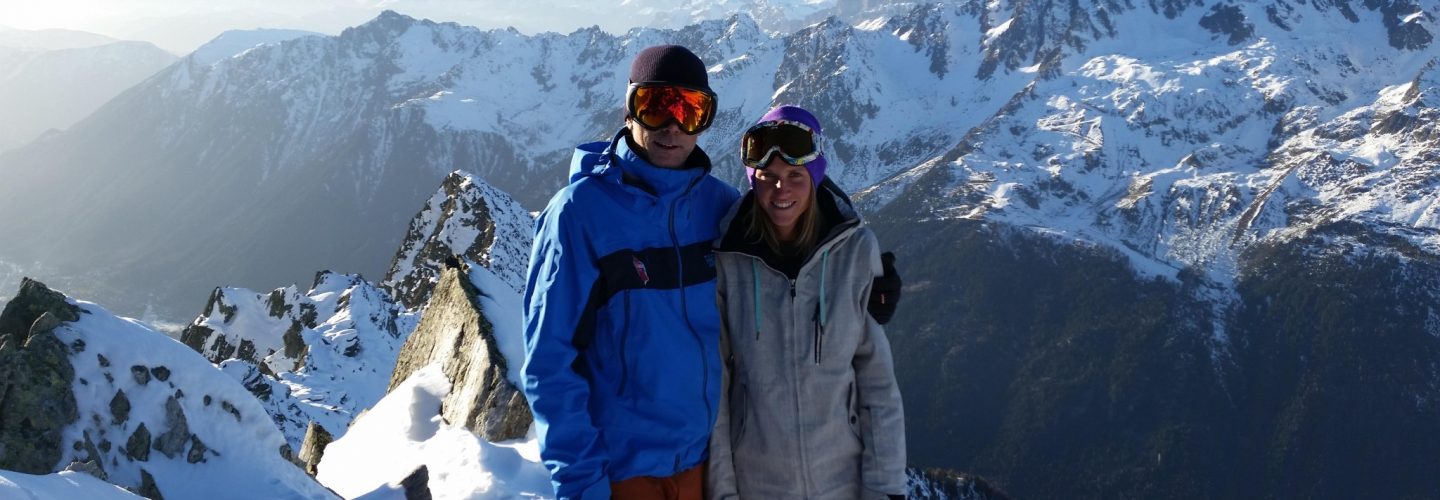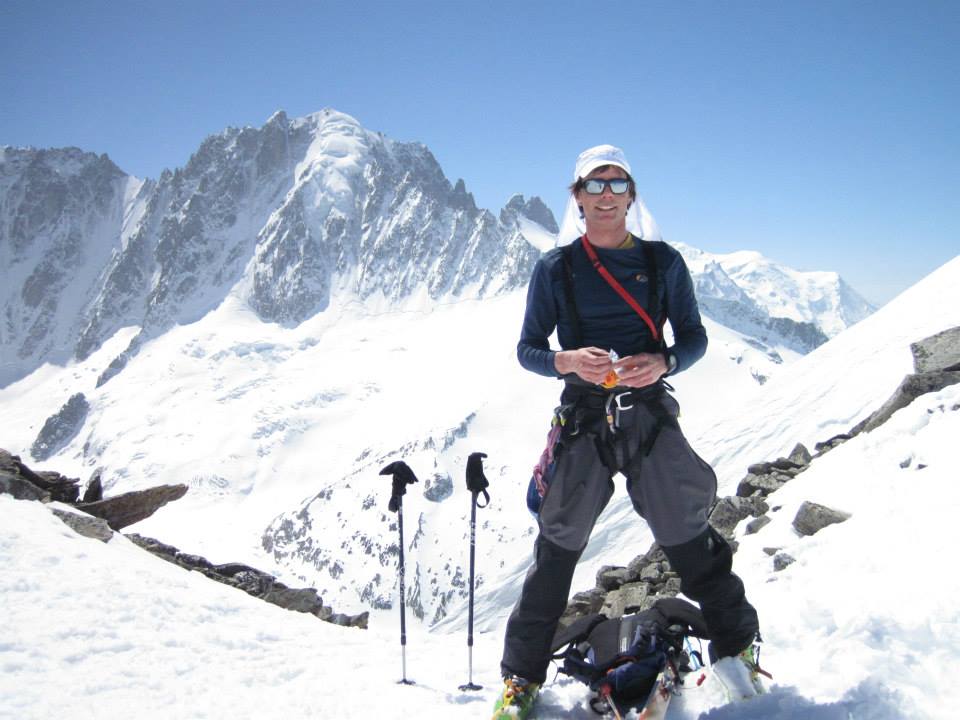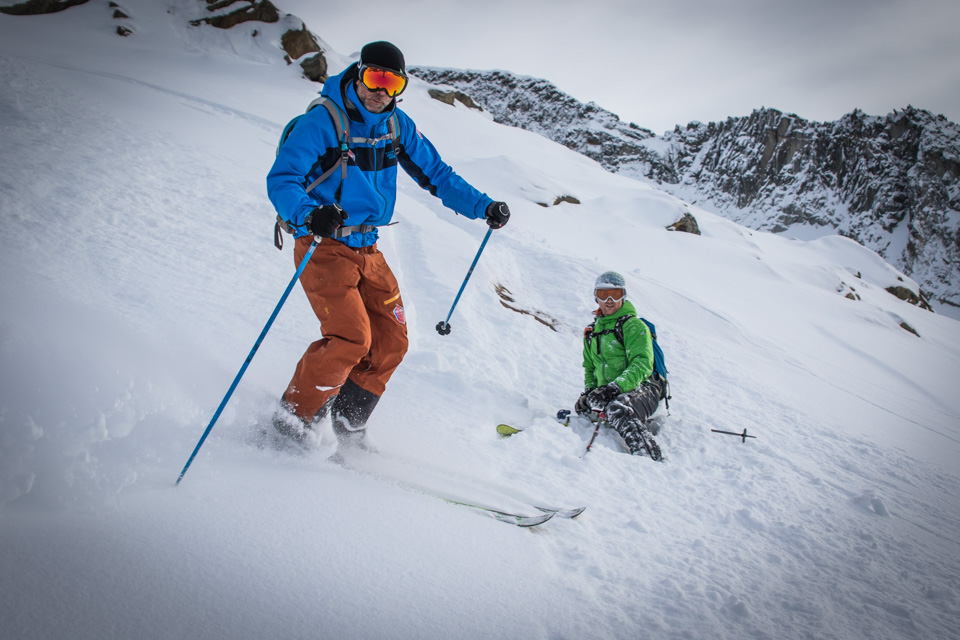It’s a turbulent time for British ski teachers working in the Alps, particularly the French Alps, where most Brits go to ski.
After the highly publicised issues over various French legal cases against British ski teachers, mountain guides, ski hosts and ski schools operating in the French Alps without, the authorities claim (but the Brits concerned still dispute) adequate qualifications, which have come to ahead over the last few years, we now have the Brexit vote and its unknown, but potentially bad, implication for Brits working in the EU.
And then there’s the good old fashioned issue of snow – two fairly snowless starts to the season in the Alps over the past two winters haven’t helped much.
Here Fred Dibblee, a ski instructor for 14 years, who IS fully qualified to teach in France (even by French standards!) and his girlfriend Fay Manners, a snowboard instructor who is still working towards the highest level of qualifications required in France and so currently commutes over another EU border in to Italy and even out of the EU altogether in to Switzerland from their home in Chamonix to work, give their perspective on where we are now, and the season ahead.
Fred’s seasons over the past decade-and-a-half have spread from New Zealand and Queenstown to some key Northern alpine resorts such as Courmayeur, Verbier, Courchevel, Tignes and now Chamonix.
Fay’s company is called Bad Manners Snowsnowsports. Fay is a level 2 snowboard instructor (and Level 1 BASI ski instructor) which isn’t high enough to be allowed to teach in France so she commutes to Courmayeur in Italy just over the border to work for British tour operator Interski, and also to Verbier in Switzerland, a little over an hour away, where she works for Altitude.
“I am fortunate that my Chamonix Mont Blanc ski pass covers both Courmayeur and Verbier too! When I am not commuting to work for Interski or Altitude, I am training so that I can achieve full French equivalents for snowboarding. I hope that in the next two years I will be able to work in Chamonix, taking clients into the backcountry split boarding!” says Fay, who also enjoys mixed and ice climbing in her spare time.
Thoughts For The Coming Season
“After a summer of completely different goals to skiing there is always trepidation as to what the new season might bring. Will it be an early start? Is the pound strong to the euro? and of course this season, how will Brexit effect things? The economic down turn through 2009 was another time of concern but the ski industry, at that time, seemed to push on through relatively unscathed,” says Fred, who adds,
“Hopefully the same will happen for the future as we’re sure Brexit believers are doing it for the wealth of the British people- therefore giving them more money for holidays! Brits are always going to want to go skiing, just like our European neighbours and those who do put their horizon beyond the “white cliffs of Dover” will always make ample use of the continent.”
Chamonix is a great example of many people from different places gathering to be in a place where they find what they want to do, Fred believes.
“From Edward Whymper (famous English writer / mountaineer) from the 1800s, who has his name stamped on Chamonix, to now with all the UK expats living/ retiring/ working and commuting from Chamonix and the surrounding area. It’s fair to say that the more adventurous Brit will always be a part of Europe.”
BASI Snowsports Instructors working in the Alps
Fred’s first four years were taken up working outside of France where he was allowed to work as well as train as an instructor, going through all his BASI qualifications ready to gain his International Ski Teaching Diploma (BASI Level 4) and therefore the right to work in France.
“It is good to work in France as their rules govern that the Instructors get a majority of the income rather than the ski schools they work for. It kind of tethers that in the way some countries work i.e. Switzerland is more capitalist and “the boss” takes a greater proportion whereas France is a bit more socialist and likes to look after the common man a bit more,” says Fred.
Passing the Euro test (a timed GS slalom event) and all the other components of the BASI Level 4 that winter was a great challenge and, looking back on it, he loved it!
“Imagine back to passing your driving test- most instructors would times that by 10 for certain elements of the process.”
The following season he went to work in Tignes for a long period teaching and further learning his trade and gaining experience.
“Summer seasons have led me to follow my passions of the hills in general, especially rock climbing, and due to this I’ve gained my Mountain Instructors Award (a UK based qualification) and a greater passion for the scarier bits of mountains. Along with Fay’s keen-ness for mountain life it seemed a natural decision to move over to Chamonix and see what life as an instructor there would be like,” adds Fred.
Tignes V Chamonix
Tignes and Chamonix are very different, according to Fred. Tignes, being based high up, has easy door to slope access but like most man made ski resorts, it is all skiing and not much else. Chamonix is a lower alpine valley where a proper town has developed with lifts taking you up just as high to five different ski areas (not including the 3842m Aiguille du Midi!).
It works well having different ski areas as there is usually somewhere good to ski if the weather is bad. It is a bit of a bind having to use a car to get around but the free bus links are good and with access provided by the valley train also- there are a variety of way to get around.
“Chamonix is not a typical resort like Tignes, Courchevel, Val Thorens, etc but wow! it does have its diversity. The town is a thriving place all year round so is a centre for many things. It goes without saying that the apres ski has been regarded among the best in the Alps,” says Fred, who adds,
“Unexpectedly, beginners are not a rarity either! There are many groups that visit Chamonix and the beginners often attach themselves on to their more experienced friends. These beginners are a ski instructor’s “bread and butter”. For such an extreme resort it’s funny that whether at the lower, middle or upper end of the Cham valley there are some great beginner areas,” says Fred, who adds.
“My favourite is La Tour and the Vormaine slope, a great wide consistent angled slope for flowing turn repetitions – it’s awesome!” says Fred, adding,
“A great need for those “time poor cash rich” types is an Instructor to guide them round the Cham area, improving their technique whilst taking the slopes in progressive stages. Knowing where the good conditions are and avoiding the pit falls of that nightmare run that was supposed to be a blue but felt like the black run from hell!”
There are plenty of higher end “advanced” skiers doing the rounds trying to ski every piste possible before their holiday is up. The true Chamoniard extreme skiers will hardly be seen. They are just a select few (relatively speaking) who’ll be up high on the glaciers hiking couloirs at 3500m and hiding in huts waiting for the best powder conditions, explains Fred.
“To go up the Aiguille D’Midi lift is one way to feel extreme. Sharing the cabin with Mountain Guides, Mountaineers, Ice climbers and even Base jumpers. It’s a good way to feel intimated if you’ve booked to do the Vallee Blanche (the famous 20km off piste adventure) or a way to feel relieved if you are just going up for the views,” Fred confirms.
Pre-Season Prep
“From a more personal point of view I’m just in the process of getting my equipment updated as a yearly chore. From Skis and boots to gloves and goggles, all have to be checked, restocked and made ready,” explains Fred, “It’s an expensive job but it’s very important to look professional and have your gear working properly through all weather conditions.”
“Filling up my diary for the season is the next quest. Christmas, New Year, Half Term and Easter are all filling in so now it’s down to promoting myself well to fill in the gaps (time to clear my throat and say “FDskiing.com!”). Repeat clients are good to have too and it’s great how some become loyal enough to choose their ski holiday for when you are available. Also with Chamonix being so close to Geneva it’s not uncommon for clients to ring up spontaneously when news has got out that powder will be around for the weekends!”
Why Become an Instructor?
“Initially for me I got hooked on the BASI pathway. From Level 1 to Level 4 whilst instructing along the way has been a great challenge. Different countries, different resorts, different bars and different people along the way was a great whirl wind adventure when I look back on it. That was all nearly a decade ago now and doesn’t seem that far back,” says Fred, adding,
“I’d do it all again just for the buzz of passing the Eurotest! Nowadays I still enjoy it. It’s important not to work till you are burnt out if you still want to love it. Moving to Chamonix where the things to do are more endless and I work more for myself has got me more engrossed in teaching well. Understanding people more comes with age and it’s a great skill to keep on improving- the ability to communicate.”
That’s not all though, Fred says, improving as a snowsports instructor brings out some great skills any human being should develop. Apart from being a communicator, simple things like fitness get vastly improved. Your general skill level goes up from balance, agility and cognitive performance.
“Observational skills become Jason Bourne like (well not quite). You do funny things like check out people who walk slightly different or find a better understanding of other sports because you how the body moves for that particular sport. This last one can be taken from both angles but you develop a quick sense for changing plans for the better,” adds Fred, continuing,
“Coming across better/worse snow conditions, unexpected lift cues, or differences in clients perceived abilities can change any plan an Instructor might have had. My girlfriend curses me sometimes for not having made plans but I find being open minded to go where the future is best works really well. I’m not just making it up as I go along.”
For the Future
Fred would like to expand his role to work more on summer mountain activities as much as winter.
“Fred loves all aspects of the mountains. When he isn’t teaching, he is doing things like ice climbing the Aiguille du Chardonnet or ski touring up to Pointe Isabelle. I think his clients enjoy their lessons because of his real adventurous spirit,” says Fay.
Living in Chamonix and getting into the winter mountaineering side of things means Fay is seeing the benefits of skis for high mountain access, says fred, concluding:
“I think a few more years here and I’ll have her back on skis for good! Who knows, maybe we could start up a little instructing partnership one day.”










